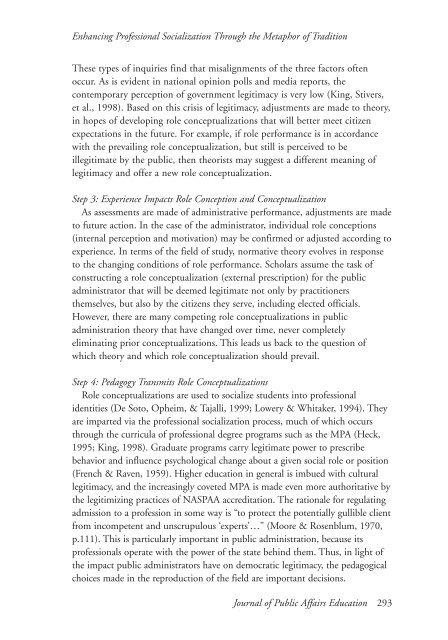JOURNAL OF PUBLIC AFFAIRS EDUCATION - naspaa
JOURNAL OF PUBLIC AFFAIRS EDUCATION - naspaa
JOURNAL OF PUBLIC AFFAIRS EDUCATION - naspaa
Create successful ePaper yourself
Turn your PDF publications into a flip-book with our unique Google optimized e-Paper software.
Enhancing Professional Socialization Through the Metaphor of Tradition<br />
These types of inquiries find that misalignments of the three factors often<br />
occur. As is evident in national opinion polls and media reports, the<br />
contemporary perception of government legitimacy is very low (King, Stivers,<br />
et al., 1998). Based on this crisis of legitimacy, adjustments are made to theory,<br />
in hopes of developing role conceptualizations that will better meet citizen<br />
expectations in the future. For example, if role performance is in accordance<br />
with the prevailing role conceptualization, but still is perceived to be<br />
illegitimate by the public, then theorists may suggest a different meaning of<br />
legitimacy and offer a new role conceptualization.<br />
Step 3: Experience Impacts Role Conception and Conceptualization<br />
As assessments are made of administrative performance, adjustments are made<br />
to future action. In the case of the administrator, individual role conceptions<br />
(internal perception and motivation) may be confirmed or adjusted according to<br />
experience. In terms of the field of study, normative theory evolves in response<br />
to the changing conditions of role performance. Scholars assume the task of<br />
constructing a role conceptualization (external prescription) for the public<br />
administrator that will be deemed legitimate not only by practitioners<br />
themselves, but also by the citizens they serve, including elected officials.<br />
However, there are many competing role conceptualizations in public<br />
administration theory that have changed over time, never completely<br />
eliminating prior conceptualizations. This leads us back to the question of<br />
which theory and which role conceptualization should prevail.<br />
Step 4: Pedagogy Transmits Role Conceptualizations<br />
Role conceptualizations are used to socialize students into professional<br />
identities (De Soto, Opheim, & Tajalli, 1999; Lowery & Whitaker, 1994). They<br />
are imparted via the professional socialization process, much of which occurs<br />
through the curricula of professional degree programs such as the MPA (Heck,<br />
1995; King, 1998). Graduate programs carry legitimate power to prescribe<br />
behavior and influence psychological change about a given social role or position<br />
(French & Raven, 1959). Higher education in general is imbued with cultural<br />
legitimacy, and the increasingly coveted MPA is made even more authoritative by<br />
the legitimizing practices of NASPAA accreditation. The rationale for regulating<br />
admission to a profession in some way is “to protect the potentially gullible client<br />
from incompetent and unscrupulous ‘experts’…” (Moore & Rosenblum, 1970,<br />
p.111). This is particularly important in public administration, because its<br />
professionals operate with the power of the state behind them. Thus, in light of<br />
the impact public administrators have on democratic legitimacy, the pedagogical<br />
choices made in the reproduction of the field are important decisions.<br />
Journal of Public Affairs Education 293
















